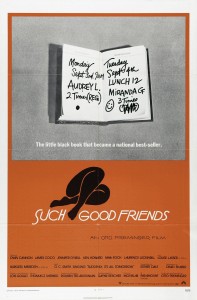Such Good Friends (1971)
“Now that the damage has been done, your husband’s care will be of the finest.”
|
Synopsis: |
|
Genres, Themes, Actors, and Directors:
Review: Making matters worse, we don’t like any of these characters — not even the protagonist (Cannon), whose plight we should presumably empathize with. Our distaste for Cannon’s spoiled housewife is cemented from her very first scenes, as she mutters, “Why did they abolish slavery?!” in frustration when her black maid can’t hear her petulant request to answer the doorbell. When events quickly turn more serious, she thankfully drops her characteristically ditzy screen persona and invests her character with gravitas and nuance, turning in what’s probably one of the best performances of her career. However, she’s at sea in the midst of a messy cinematic train wreck, one even her emotional investment simply can’t salvage. Note: My opinion of this film diverges considerably from most other critics: Roger Ebert gives it four stars out of four, Stuart Galbraith IV of DVD Talk refers to it as “just about as good” as Annie Hall (!!!), and others point out the wittiness and elegance of the dialogue. It’s likely that my overall distaste for how Preminger handles the material is shadowing my ability to appreciate much else about it — but regardless, I consider this one to be a true clunker. Redeeming Qualities and Moments: Must See? Links: |


One thought on “Such Good Friends (1971)”
Not a must.
On revisiting ‘SGF’…though it’s not good, it’s certainly not as bad as other Preminger pics of this period. It does share the uneven quality of Preminger’s films from (at least) the mid-60s to the early 70s, but it’s at least watchable. Again, tho, its not that good.
Elaine May was attached to this project at the same time she gave us her own brilliant ‘A New Leaf’. Whatever script she wrote was then adapted by someone else – not particularly a good sign (significantly, she took her own name off for screen credit – also not a good sign). I’ve not read Gould’s novel, but one can certainly hear May’s voice all through this film, and often that voice is not only distinct but funny. But there are also times we do not seem to hear it at all. For example, early on, Cannon attends a party celebrating the publication of her husband’s book for children. At the party, she is introduced to and then dances with Burgess Meredith – who she keeps seeing as nude. Why? For what possible purpose? It’s never explained and it makes no sense. Some other scenes, as well, seem disastrous. Occasionally there’s some overly wordy dialogue.
I’m in agreement with the assessment that Preminger has no satisfying tone here. He clearly wants to remain experimental (though he seems to have learned from ‘Skidoo’ that a filmmaker cannot be so experimental that his film is excrement). But, for some reason, I kept thinking this film might have been better if May (or, at any rate, a woman) had directed it. The result – though not downright awful – is still lazy and sloppy. It doesn’t even look filmed well.
My favorite scene arrives when Cannon has gathered many friends together at the hospital to donate blood. The scene reads like some of May’s best writing, as she takes the opportunity to create mini-plays among the donors. (Louise Lasser is particularly good in this, her only scene.) The only other memorably comic moment comes later, when James Coco (Luckinbill’s doctor) is suddenly seduced by Cannon and does everything he can to prevent her from knowing he wears a girdle – his attempt to remove it surreptitiously is awkward, sad and hilarious.
Other than Lasser and Coco (as mentioned), Sam Levene, William Redfield and Doris Roberts come off well in bit parts – but the actors generally seem hemmed in. Luckinbill (so memorable in ‘The Boys in the Band’ but eventually mostly a tv actor) only registers slightly here.
I do think Cannon redeems herself nicely overall. She’s generally interesting to watch and, oddly, we feel for her. Cannon had recently made a splash in ‘Bob and Carol and Ted and Alice’ and would soon after give us a delicious turn in ‘The Last of Sheila’. But her career does seem disappointingly spotty.